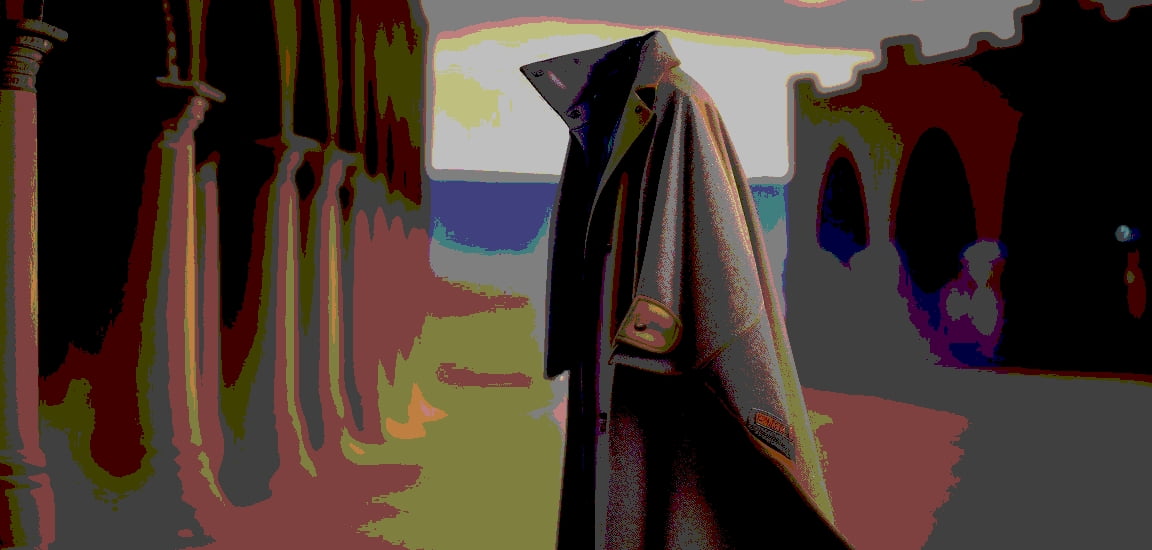
“We all came out from under Gogol’s Overcoat” – Eugène-Melchior de Vogüé (often misattributed to Dostoevsky).
I’m stuck between the stitching, picking out hairs of long dead men. A damsel in distress in a tower of cat collar because Akaky Akakievich couldn’t afford marten. After Nabokov’s exit, everyone on the outside must have thought “enough,” because no one’s come to try the overcoat on for size again. I’ve not given into despair. Most days.
“Hello? Anyone?” These my ritual shouts into the lining, in case someone new’s been fashioned from cloth and they’re shy.
There’s a noise from outside like moth scatter. Despite nearly two centuries hoarded up between layers of knee-length wool, I hope. Can it be someone to try me on? Hope is a pain. A violence that cuts twice, upon its having and upon its loss.
“Hello?” my voice reaches only as far as the last frayed stitch.
Hands reach in. Small, skin still thin. Not eight years out the womb. Soft as velvet. The overcoat and me double over the child, a boy. He wears us like a shield and runs out of the closet where we’d been stored.
“Boy! Listen.” I’m speaking into his eyeballs, because it’s where the collar naturally rests. “I’ve a hundred years of stories to share.”
The boy is all bones. Dirty, disheveled, and when he hears me, scared.
I tighten the belt to better buffer against the Eastern Winter.
“Make me laugh,” he says, satisfied enough I mean him no harm or willing to take that risk.
It’s been too long without humans big and humans little. What humor I know is coat humor: armpit sweat and sagging bellies. Inseams. Butts and how a coat can hold in a fart for two blocks at a brisk walk.
The boy farts instead of laughs, testing the math. Except these blocks have changed in length and composition.
“Where are we going?” I ask.
“Away.”
I let the answer stand as is, because it’s enough not to be alone anymore. The longer he wears me the stronger I become. Soon I’ll slip out of the fabric. Be my own. Spread my word.
“Where are we, Russia or Ukraine? The USSR?”
“Yes,” he says, as if it’s an answer.
For a while, we say nothing. The boy’s head is half in the coat, his breath warm and steaming. Cloth chafes against the wind, composing music as they meet. Steel birds cut the sky overhead. The boy stops. There’s a path of torn earth we must pass.
“What’s wrong?”
“It’s fresh rubble,” he says. “Make me laugh again.”
I tell jokes to calm his heart. Jokes too old for a boy his age because they contain bad words and dark times. “Where do little boys who can’t survive on their own go?”
“Where?”
“Nowhere.” I wait for a laugh I know won’t come. “I’m sorry, it’s not to be cruel, it’s just the sense of humor I was made with.”
“Is it funny because I’m that little boy going nowhere?”
He gets more than he should. Circumstances age people up the way time would if it had enough supply.
His feet are atop mine to help hasten our steps because my legs and feet are bigger than his, and my stride longer. The longer our contact, the stronger my form becomes. We move past the rubble.
“Is the world ready for me, the way it was for Tolstoy?”
“No.”
It’s so jarring, at the next step I lose my hold and we trip. He, still in the coat and I, out. Adorned in a wardrobe of lint, but free.
The boy struggles to rise. Without me the coat is heavier, the wool itchier.
I help him up, his little hands curled in mine for balance.
“You wear it well,” I lie.
“You’re leaving.” He doesn’t ask, it’s a statement of fact from a boy who’s not being left for the first time but every new time is a reminder of that first.
“I need the coat,” he says.
“You can have it.”
He turns away first, letting the coat trail on the broken stones of the road. The belt undone from the fall. If not warmth, what’s he need it for? A fart’s block away he takes it off and folds it once, twice. Carries it around his bony arms like a scarf.
What is this world anyway he’s taken me out to? I look around, it’s easier without any coat to bind my eyes. We’re in some war zone, a page from Tolstoy’s War and Peace. It doesn’t matter if the world is ready. Tolstoy never asked permission. Or I can stay an idea, a seed planted with needle and thread because the boy is ready and wanting.
I give chase, loud enough so he’ll hear me approaching and not panic at the sound.
“What do you need it for, if not to wear?” I ask. The sleeves beckon me inside to silky darkness.
“My papa said we have to protect the coat, says it’s enough so long as it exists.”
“Without me it’s just a coat, kid.”
He doesn’t want to believe me, to go against his father’s words when I’m just an intimate stranger who tells bad jokes.
I take the coat. It feels different, exposed. It’s easy to slip it on again. It’s missed me. I wrap myself and the coat around the boy. Lose myself to stitch and buttons.
“What are you doing, what about your stories?”
I waited a long time for my chance. I can wait a little longer. It’s enough that somewhere there was a father who told his son about an overcoat that existed, without ever having seen it or tried it on. Its existence was enough. And the boy believed him; the way so many boys want to, especially if their fathers are good men.
“Where do little boys go who can’t survive on their own?” I ask again.
“Nowhere.”
“Wrong. They go everywhere.”
Yelena Crane is a Ukrainian/Soviet born and USA-based writer, and incorporates influences from both her motherland and adopted home soil into her work. With an advanced degree in the sciences, she has followed her passions from mad scientist to science fiction writer. Her stories appear in Nature Futures, DSF, Third Flatiron, Flame Tree, and elsewhere. Follow her on twitter @Aelintari and Yelena Crane.

